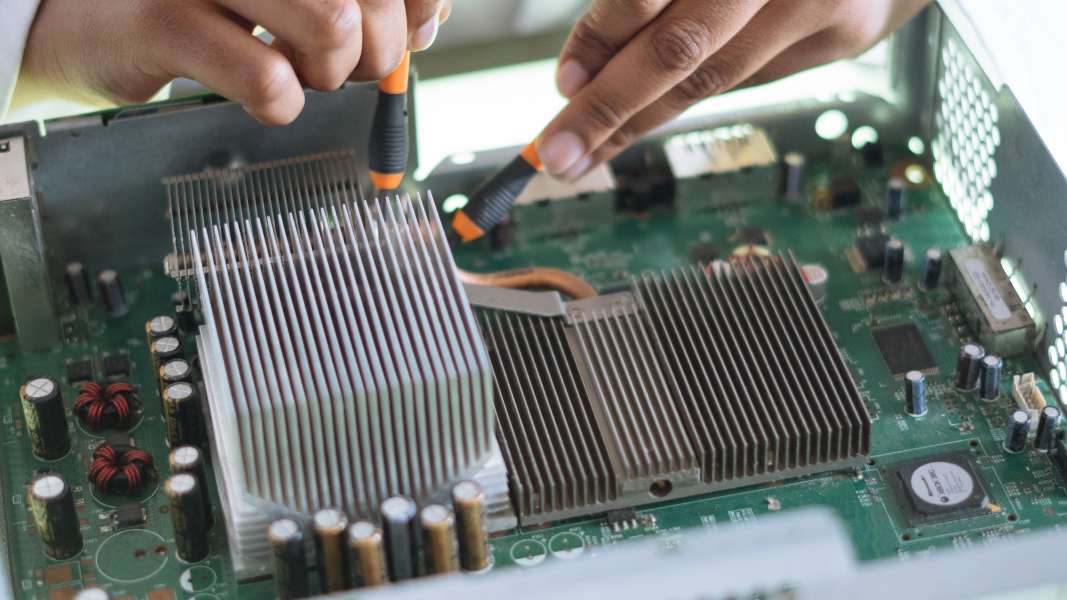
How To Hire A Computer Technician
June 30, 2022

Any business running critical IT systems needs a competent computer technician overseeing its infrastructure. It falls to these technically skilled employees to monitor, maintain and repair IT hardware and software, implement improved processes, and train other members of staff on the use of computer equipment and programs.
Without effective IT support, a business is vulnerable to prolonged downtime resulting from system failures, and costly interruptions to operational activity. It's also left open to IT security breaches, and risks running outdated systems that do little to improve productivity.
A computer technician brings the skills, knowledge and expertise needed to ensure the continuous running of effective IT systems, which is why it's so important to make a well-informed decision when hiring for the role.
This article covers the key skills and abilities to look for when recruiting a computer technician, as well as offering advice on the best pre-employment tests to use as part of the selection process.
What should a computer technician be able to do?
The job description of a computer technician is broad, with the role involving working on long-term projects as well as resolving technical issues on a day-to-day basis. There will also be some variation in responsibilities according to the specific business or organization the technician is employed by.
Typical tasks assigned to a computer technician however include the following:
- Installing, testing and configuring IT hardware and software.
- Troubleshooting and repairing equipment, devices and programs.
- Managing network components such as IPs and servers.
- Regularly updating IT systems to ensure full functionality.
- Performing routine IT maintenance.
- Installing and monitoring security software to protect from attacks and data breaches.
- Training staff on the use of new and existing hardware and software.
- Responding effectively to technical questions from non-technical employees.
- Researching and testing new solutions and equipment to improve IT infrastructure.
Skills to look for in a computer technician
A good computer technician will display a combination of key hard and soft skills that prove they have not only the required technical competence but also the non-technical skills that support productivity and effectiveness in the workplace.
The core skills to look for when hiring a computer technician are:
Problem-solving: a computer technician oversees many working parts that together make up a company's IT infrastructure. When a problem arises, it is their job to identify its source and determine the most effective solution. This is typically anything but a straightforward process, so they must have keen problem-solving skills.
Communication skills: though they spend a lot of their time working with equipment and software, communication skills are still vital for a computer technician. They will need these to discuss technical issues with non-technical staff, listen attentively to those that may not know the right terminology, ask the right questions to fully understand a problem, and explain complex information in simple terms.
Teamwork skills: when working as part of a wider IT department, a computer technician must have the skills to both rely on and support others. This will ensure tasks are completed to the highest standard and that IT infrastructure runs smoothly. Even in a small business, where a single technician may be employed, they must actively engage with other teams to monitor and manage effective systems.
Organizational skills: the nature of the job means a computer technician is often faced with competing demands and never-ending to-do lists. To cope with this, they must have strong organizational skills that enable them to manage their time effectively. They will also use their organizational skills to keep detailed records and store information in a logical fashion.
Technical skills: it goes without saying that a computer technician should have a high level of technical skills. This pertains to hardware, software networks and operating systems. In some cases, it may also be useful for them to have skills in a particular programming language.
Useful abilities for a computer technician
When hiring for any role, it's important to look at a candidate in a holistic manner. This means addressing not just their qualifications, experience and skills, but also their natural attributes, behaviors and abilities.
For a computer technician, key things to look for include:
Analytical thinking: the role of a computer technician requires creative problem solving, but it also requires logic, which is where analytical thinking comes in. They must be able to decipher how one part of a system, and any changes made to it, affect another - and the impact that will have on IT infrastructure as a whole.
Attention to detail: a computer technician needs to be able to spot the smallest of errors at speed, and must also avoid making mistakes of their own when carrying out their duties. They'll apply attention to detail in almost every aspect of the job, from interpreting error reports to configuring systems.
Numerical aptitude: though often overlooked in the selection process, numerical aptitude should be on your list of essential criteria, since data interpretation and mathematical ability are a key part of a computer technician's role. They must be confident in analyzing report data to spot areas of weakness and understand mathematical operations such as binary notation.
Inquisitiveness: to be most effective in their role, computer technicians must keep up to date with advancing technology, which means they must have a curious mind and an ongoing desire to learn. A candidate with an inquisitive nature will prove a far more valuable investment than one that prefers to stick with the status quo.
Adaptability: this applies to the way they approach their work, and their openness to new systems and processes. On a daily basis, a computer technician may need to adapt their schedule to deal with unforeseen issues, whilst in the long-term, they must be happy to experiment with different solutions that may strengthen IT infrastructure.
Which soft skills tests could I use to hire a computer technician?
When planning pre-employment testing, you should look for assessments that measure the skills you consider non-negotiable for the role.
In the case of a computer technician, soft skills tests that would help inform selection include:
Problem-solving: these tests look at a candidate's skill for understanding the root cause of any given problem, and working towards an effective solution through both logical and creative thinking. A high score tells you the candidate has a talent for unraveling and resolving complex problems.
Teamwork: with a teamwork test you can predict how successful a candidate will be in a collaborative environment, a crucial skill for a computer technician employed as part of a wider team. Multiple-choice questions measure key behaviors that make for effective teamwork.
Time management: this test is useful for establishing if a candidate is capable of juggling the ever-shifting demands of the role. Skills such as organization, prioritization, scheduling and meeting deadlines are assessed here through various hypothetical scenarios.
Communication: a communication skills test will give insight into a candidate's ability to listen attentively, use appropriate language to express an idea or opinion, and engage in constructive debate. These are key skills for a computer technician, who must discuss technical information with non-technical staff regularly and put forward arguments for the adoption of new technologies.
Which technical or aptitude tests could I use to hire a computer technician?
To further establish a candidate's suitability, you should administer role-appropriate technical and aptitude tests in the screening stages of recruitment.
For a computer technician, the following tests will prove beneficial to recruitment:
Abstract reasoning: this test looks at logical thinking, challenging a candidate to identify and apply sequential rules to solve abstract problems. This is similar to how they'll approach their daily tasks, evaluating each part of IT infrastructure based on how it relates to other component parts and the system as a whole.
Numerical reasoning: in a numerical reasoning test, candidates must interpret data sets presented in tables, charts and graphs, and use that interpretation to form logical conclusions. A high score tells you they're able to make data-driven decisions, as a computer technician must do when evaluating IT performance.
Error checking: this is a measure of concentration and attention to detail. Candidates must check for errors and inconsistencies in repetitive information - a skill they'll need to apply often as a computer technician. Given the time constraint attached to the test, it also gives assurance that they're able to work with accuracy whilst under pressure.
Whilst the above assessments focus on natural aptitude, technical ability should be measured through programming and/or software tests. The nature of these will of course depend on the software you use, and the extent to which the employee in question will need to apply programming skills.
Our recommended test battery for a computer technician
Along with pre-employment testing, a good recruitment strategy also pays attention to the candidate's experience. This means not administering so many tests that applicants are deterred by the process.
You want to narrow it down to a test battery of three or four, the combined results of which will help you build insightful candidate profiles. Here's what we recommend:
Abstract reasoning: to measure essential analytical thinking and problem-solving skills.
Numerical reasoning: to assess data interpretation skills and how a candidate applies them in the decision-making process.
Communication: use this test to ensure they have the ability to convey complex ideas and information, as well as listen attentively to the needs of others.
Error checking: finally, use an error checking test for assurance they have that all-important eye for detail.
For more information on hiring a computer technician, visit our computer technician test page.
Boost your hiring power.
Start using Neuroworx today.
Talk is cheap. We offer a 14-day free trial so you can see our platform for yourselves.
Try for free




